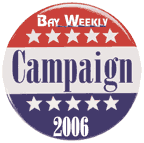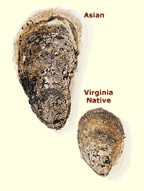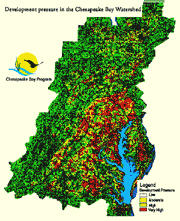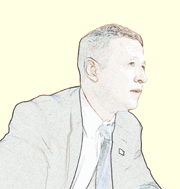Giving Them Their Say
A Bay Weekly Exclusive Dispatch From Maryland’s Red-Hot Governor’s Race
When the gleam appeared in Martin O’Malley’s eye, everybody knew Maryland was in for a barn-burner gubernatorial election. Especially Gov. Robert Ehrlich.
Four years ago, Ehrlich, who had been a congressman from the Baltimore suburbs, became the first Republican in a generation to crack the Democratic stranglehold on the governor’s office. With the help of the post 9/11 GOP tide, Ehrlich easily defeated Kathleen Kennedy Townsend — and in so doing gave Maryland Republicans hope that a new day had dawned for their beleaguered minority.
Ehrlich’s victory also marked a generational shift in Maryland politics, which continued in the Maryland primary last month with Peter Franchot’s defeat of the iconic William Donald Schaefer in the comptroller’s race.
But to succeed, Ehrlich, 46 when he took over in Annapolis, needed a political change of clothes: In Washington, the Arbutus native had been part of the take-no-prisoners troop of Newt Gingrich conservatives, no battle plan for a moderate blue state.
Ehrlich has, indeed, moved toward the center, not always with the results he hoped for. Even with segments of the Democratic-run General Assembly behind him, his two-year drive to legalize slot machine gambling came up snake-eyes.
The governor has displayed a stubborn gene, too. In a state with a pronounced green streak, Ehrlich rankled the conservation community by suspending land preservation and dismantling Maryland’s trailblazing smart-growth plan.
Yet it was Ehrlich, not a Democratic governor, who engineered a new state tax on homeowners and business to begin cleaning up polluting sewage treatment plants. Will the Flush Tax — and the environmental initiatives he boasts in this interview — be enough to assuage his critics?
For O’Malley, 43, bursting with political talent himself, the question was simple, but fateful: Run for governor, a chancy proposition, or choose a path with fewer apparent obstacles toward the Senate seat vacated by Paul Sarbanes.
Many believe that the ambitious O’Malley took the tougher route for one reason: These days it’s governors, not members of Congress, who get serious looks as presidential candidates.
Yes, O’Malley’s ceiling is high. But first, he must get by Ehrlich, a popular and youthful politician himself and one who seems ready to do what it takes to keep his job with its roomy office in the nation’s oldest working capitol.
O’Malley has won accolades as the mayor of Baltimore. Time Magazine called him one of America’s five best mayors, which he is trumpeting in new ads. But there’s political risk running a hard-bitten city known to television audiences as America’s classic venue for murder and drug mayhem. That’s probably why he wasn’t happy about adding HBO’s ultra-gritty The Wire, successor to Homicide and The Corner — to his city’s rap sheet.
Ehrlich is doing his best in sometimes over-the-top advertising to tie O’Malley to everything from corruption to police mistreatment of African Americans. Will Ehrlich’s gut-tough ads stick on the wall?
O’Malley is mindful of the potent pro-conservation vote in Maryland and proposed his so-called BayStat programs while chastising Ehrlich for his shortcomings. The environment is certain to be a key issue in the gubernatorial debates this month.
In interviews in recent days with Bay Weekly, Ehrlich and O’Malley spoke at length about the environment and other issues.
Governor Robert Ehrlich
a Bay Weekly interview with Editor Sandra Olivetti Martin
Bay Weekly As you’re campaigning for four more years, you must have liked this job. What’s been a high point?
this job. What’s been a high point?
Robert Ehrlich You have to answer that question in two ways:
One, the job itself. Every day understanding that you’re the chief executive of the state. How people view leadership: They treat you with incredible kindness and respect. That in itself is obviously humbling and wonderful. That’s the fact of the job.
As far as the highlight of the policy end, there’s a tie. The Chesapeake Restoration Act was groundbreaking. It was hugely important, innovative and is already effective.
That ties with the budget turnaround.
Turning a $4 billion deficit to a $2.2 billion surplus over three running years, three fiscal years, that is a big deal, and it had to be done.
Bay Weekly In a job where every decision is sure to displease somebody, there must be as many low points as high. What’s made you maddest — or rue the day you ever decided to try to be Maryland’s first Republican governor since Spiro Agnew?
Robert Ehrlich The change in the political environment within the statehouse, within the General Assembly.
As a young delegate from northern Baltimore County, I was adopted by the system. Senior Democrats adopted me. I was adopted by the John Arnicks, the Clay Mitchells, by the Danny Longs, by the Bill Horns. I was made party leader of my committee. I was given bills to handle on the floor of conference committees. There was literally not a partisan line, and it was not just me. That helped me, one, become a better legislator, particularly as a young person. And, two, it ingrained in me an appreciation for a system of legislature and the way it’s supposed to run. Three, it made me love Annapolis even more than I already did. I met Kendel here, we were married here, she worked here, we socialized here: This is another home for us.
Contrast that with coming back and seeing a miniature Capitol Hill had developed. I returned to a much more partisan, a much more antagonistic relationship with the General Assembly. There were clear partisan lines. Some — not a majority, but some — simply never got over the fact that a Republican was able to get elected governor in the state. For some, a minority, it’s just been retrenchment and opposition for four years rather than cooperation and progress.
Bay Weekly How do you, as a sports fan and a sportsman, figure your win-loss record — factoring in slot machines?
Robert Ehrlich Well, it’s more wins than losses, particularly in the first three years.
We have a pretty good relationship with the Maryland senate. We have always had issues with the House leadership. But we were able to get disabilities, Chesapeake Restoration, brownfields done. We were able to get the ICC done. We were able to secure protections concerning children, plus driving bills and higher ed bills, K through 12 education and charter schools. We got my budget priorities done. Really a lot of policy successes in those years.
The past year, the last session was not so successful. To begin with, the special session on medical liability reform, which did not pass, and ended up in a very poor posture.
My two biggest disappointments have been the failure to get slots and structural tort reform passed.
I am quite pleased however, that I have been able to kill $7.5 million in taxes, mostly directed to small business people.
So part of your successes is what passed, but another part is what you’ve been able to defeat.
Bay Weekly Maryland League of Conservation Voters gave you a D grade on their environmental report card for the last two years, and only a D+ for the first two years, despite your success in creating the Chesapeake Bay Restoration fund. Did that make you mad?
Robert Ehrlich I think they’re viewed as a partisan group. We tend to dismiss their report card, as do most members of the General Assembly.
We’ve worked very well with the Chesapeake Bay Foundation, and we’ve always viewed them as the neutral group, philosophically nonpartisan. We work with any group that wants to work with us. But those with a more partisan edge, we tend to dismiss them.
Bay Weekly In what sense is the league partisan?
Robert Ehrlich Politically partisan. You find me a good grade given to a Republican. That doesn’t mean we can’t work with them on a selective basis, on an issue.
We’re running on my environmental record. If you talk to people active in the environmental community — not just Bay restoration, but tributary strategies, Three P regulations [Ehrlich’s Clean Power Rule set limits for sulfur dioxide, nitrogen oxide and mercury], the Four P bill [Maryland’s subsequent Healthy Air Act set tighter limits for the Three Ps and added carbon dioxide], land preservation, Open Space, oysters, Bay grass restoration.
Everything that we’ve led in is part of our environmental record. So I can’t get hung up on that stuff. Groups have their partisan edge — both on the left and right — and you just can’t worry about that.
Bay Weekly Every point you make is challenged by the Democratic Party. For example, O’Malley-Brown are taking issue, one by one, with your 101 Outstanding Ideas for Maryland. Under the heading Commitments Made, Commitments Broken, they’ve cited what they call unkept environmental promises, like giving tax breaks for hybrid cars and planting 10,000 trees a year, building more parks and increasing recycling in every town and county.
What do you say to their challenges?
Robert Ehrlich We keep track of those commitments. Obviously we’re running on our environmental record. I just hit a few of the highlights. We have many, many more.
O’Malley has been running for governor for five years. He’s a wannabe. If I started going back and forth with wannabes, then I’m not governor, I’m just a candidate. The fact is, I am governor, and I’m going to be judged on my record.
He has no environmental record. So it’s always relatively easy to sit in the bleachers and throw spitballs, and that’s what he’s done for five years.
Bay Weekly Given O’Malley-Brown’s challenges, what do you say to voters, who aren’t keeping such close score and might even be confused by the political game of point-counterpoint, about why they should believe in you, vote for you?
Robert Ehrlich For the most, people don’t pay any attention to that stuff. Voters don’t pay attention, even activists. They judge you on your budget priorities, your policy successes, have you used the bully pulpit effectively, have you worked with groups like the Chesapeake Bay Foundation to get big things done. Not on what a wannabe says on the campaign trail.
Bay Weekly How have you used the bully pulpit effectively?
Robert Ehrlich On our successes; also our challenges.
I take every opportunity to discuss the 2010 requirements of the Chesapeake Bay Agreement. We had the Chesapeake Bay Executive council meeting on the Shore September 22. I’m the council chair this year and next year. I thought it was important to strike a balance between these successes we’ve had over the past six years and also the challenge remaining over the remainder of the next four.
There’s all sorts of things that we’ve done. The menhaden agreement we helped broker with Virginia: Never been done. We’ve worked very well with the EPA. We’ve worked very well with the Chesapeake Bay Trust. We’ve worked with a lot of groups who I think are pretty impressed with our activism.
Bay Weekly At that meeting, the Chesapeake Bay Executive Council, you said, “We need to do more, especially in light of the looming 2010 deadline, and the fact that more than 175,000 new people are moving into the watershed each year.”
How will each one of us — us here and all of our readers — need to behave differently to make successful the four watershed initiatives agreed to at that meeting? They include increasing environmentally friendly farm management, saving and planting more trees and reducing the nutrients in farm fertilizer …
Robert Ehrlich Some of that’s self-evident. Some of it’s just the simple act of supervising your children and making sure they don’t throw trash down the gutter. Some is taking it to the next level, joining a non-profit that’s very active in a partnership with the state or federal government.
The problem with — and I’ve talked to many, many people about this — the problem with Save Our Streams, the Chesapeake Bay Foundation, you name any group, is you send a check or whatever if you want to help. You feel good about sending a check or showing up at a meeting or planting a stream buffer. But it’s such an enormous problem.
But I think the extra satisfaction and the energy-related satisfaction comes with measurement. And that’s something that excites me. For instance, my Corsica River [restoration] Project, everybody’s excited about that, and the EPA has singled it out as a national model.
It’s really exciting when you pick out a particular stream, a particular river — a place, a venue — and you make an announcement that we are going to take all the best practices, all the best science we can find, we are going to have a partnership with the local, state and federal government, all the non-profits involved in the environment. We’re choosing this river, the Corsica River, and here are what our goals are. Here is the status of the Corsica River today, and in three years and in five years, here are our goals, and you can measure us.
We now have 10 additional rivers that are candidates for Corsica 2. We have yet to select the site.
Bay Weekly Your Chesapeake Executive Council colleagues must think you’re going to be reelected, because they reelected you as chairman for ’07 …
Robert Ehrlich That was a good sign. They’re Democratic governors, too [Virginia governor Tim Kaine and Pennsylvania governor Edward G. Rendell]. In fact it was all Democrats [plus Anthony Williams, D.C. mayor].
Bay Weekly If you are reelected, what could we expect your administration do in ’07 to clean up the Bay?
Robert Ehrlich I receive on a monthly basis a memo concerning where the sewage treatment plants are in process. Though the month four might be done, six under construction, four under engineering, eight under planning. And every month I see a project unfold. On all of those plants, our goal is Enhanced Nutrient Reduction. Once these plants are operating at ENR standards, conservatively 7.5 million pounds of nitrogen and 260,000 pounds of phosphorus will stop going into the Bay each year.
One of the most exciting aspects of the Chesapeake Bay Restoration Act, however, has nothing to do with sewage treatment plants, and it’s under-analyzed. It’s cover crops. The science is relatively easy to understand: Keeping nutrient loads on the farm rather than in the water. It sounds easy, yet it has not been a priority in the past. We have more than doubled the acreage in participation, and this year the acreage will more than triple.
[On another front,] tributaries are essential to the ultimate cleanup of the Bay. We’re focused as much on tributary strategies as we are on the Bay itself. I’m very excited about the Menhaden Agreement, and I am looking forward to taking that to the next level. Oysters are also part of the answer here.
Oyster restoration is essential to the health of the Bay. I am not a scientist. I am a rooter, a fan of the Asian oyster. Unless somebody can show me that our domestic oyster can be brought back appropriately and in the numbers we need to restore the Bay, I believe my fiduciary duty dictates that I look to alternatives, because I cannot go, we cannot go, with a Bay without oysters. So I am rooting for the Asian oyster, but the science will dictate the results. I am not going to interfere.
Sewer treatment plants and oysters and the Bay grasses. Three P and Four P on the air end, which is very historic. Then add additional land preservation — we’ve done another 60,000 acres during our administration and have targeted another 50,000. These are Bay-sensitive parcels of land, directly related to the ecosystems that we are trying to achieve. And of course Corsica, too.
We have a very aggressive program on the environment.
Bay Weekly You’ve talked to us about how partisan politics is, more partisan than ever. To confront the problems that you’ve described, the health of the land and the water, perhaps more political cooperation is necessary. If reelected, what will you do to bridge that divide?
problems that you’ve described, the health of the land and the water, perhaps more political cooperation is necessary. If reelected, what will you do to bridge that divide?
Robert Ehrlich On the environment, I have to say that we’ve been able to achieve these successes because we’ve had a lot of cooperation with the General Assembly. The opposition has occurred on other fronts, other policy fronts. But concerning the environment and our major issues, brownfields reform passed in 2004, and that was a huge priority for the administration. We’ve reformed the regulatory end. Nutrient management passed in 2004. The farmer participation in nutrient management is closer to 100 percent rather than zero.
So we’ve had a lot of bi-partisan support with our initiatives. My objections, my concerns pertaining to the political environment are relevant more to other issues outside the environment.
Bay Weekly We’ve been hearing and reading that early flush tax receipts are going to projects that increase development along the way. Is that so, and is that how it is supposed to work?
Robert Ehrlich I don’t know what that means, because that’s for each plant …
Bay Weekly … by increasing capacity, enabling more houses to be built …
Robert Ehrlich The essential purpose of the Bay Restoration Act was Enhanced Nutrient Reduction, not increased capacity. You may have increased capacity as a byproduct, but I think that’s a charge from the no-growthers. The no-growthers are a minority; the develop-at-any-costs are in a minority. The vast majority of people are in the appropriate-growth mode, and that’s where we are as well.
Bay Weekly Do you take global warming as a real threat?
Robert Ehrlich Yes, but … The science is somewhat mixed. I’m not an expert by any means, but I do know this: To the extent that you can issue Three P regulations, enforce the Four P bill and really begin to attack carbon — the Three P was the big thing against sulfur and mercury — you’re making real progress as a state. Most of our problem, a great deal of our problem, is related to ozone transport from the Midwest, coal-fired plants in the Midwest. There’s very little we can do about that, that’s a federal issue. But at the state level what we’ve done in the last four years is pretty tremendous.
Bay Weekly Many people simply don’t vote, saying, perhaps that politicians are all the same or my one vote doesn’t make any difference. What would you tell them in response and in relation to your reelection campaign?
Robert Ehrlich I wouldn’t make it in response to my reelection campaign. My reelection campaign’s not that complicated. As an incumbent, you run on your record, and people either rehire you or they fire you.
I would make it more generic. For every person who I hear utter that statement, which I think is an awful statement, I also have people come up to me, two or three times a month, who typically are bashful, and say You know what? You got me to register. I had been a non-participant — for one reason or another, not necessarily cynical reasons or about politics, they’d just never bothered, it was not ingrained in them by their parents, they had been down and out. Whatever their reasons, I’ve heard it.
That’s the highest compliment. I’ll take one of those for any 10 people coming up and telling me I’m better than sliced bread. Because when you are able to reach somebody at that level, you have helped them regain their citizenship. They may have been citizens, but I don’t believe you’re an equal citizen unless you vote. I think you have an obligation to vote.
Bay Weekly Polls show O’Malley leads in single digits. What percentage do you think you’ll win by?
Robert Ehrlich For a Republican there’s probably a capped ceiling on that of around six percent, six or seven at the most. As you’ve seen from the pundits and the analysis, the trend lines are very much in our favor, and have been for the last year, which is a good thing, because you want to close strong, and that’s what we’re doing.
We won the last election by four and a half points, and our goal is to up that. A six-point win in Maryland in this particular cycle would be a very solid statement.
Baltimore Mayor • Martin O’Malley
a Bay Weekly interview with Editor Sandra Olivetti Martin
 Bay Weekly Mayor, what are your hours? You were outside D.C. working the crowds commuting on the Branch Avenue metro at 7am. What time did you go to bed last night, and when will you tonight?
Bay Weekly Mayor, what are your hours? You were outside D.C. working the crowds commuting on the Branch Avenue metro at 7am. What time did you go to bed last night, and when will you tonight?
Martin O’Malley I will go to bed tonight.
Last night was an early night. I got to bed at 10:30pm after a couple fundraisers. Today, we’re going all day. I live it one hour at a time and try to make the most of the moment.
Bay Weekly Campaigning for governor as mayor, you’re really working two very full-time jobs. Where do your wife and four kids fit in?
Martin O’Malley It’s been really hard. I lucked out in the lottery of life not only in terms of Katie but also her family. They’ve been incredibly supportive and help us with pickup after school and getting kids to cross country and all these sorts of things. Katie’s been a rock. The bad news is, because she’s a district court judge, she can’t campaign. But the good news is she’s able to spend more time with the kids. So that’s how we do it.
Bay Weekly Had you ever seen so much of Maryland before this race?
Martin O’Malley You know what? I have. I grew up in Montgomery County, Bethesda and Rockville. My father and mother always made a point of doing lots of day trips with us, to places like Antietam and Blackwater Wildlife Refuge and many other places around the state. I saw the Wye Oak before it blew down. My brother and I had Maryland history in fourth grade, and kind of in conjunction with those times we traveled all around the state. Plus I’ve had the privilege of being able to serve on a few statewide campaigns for people like Barbara Mikulski and Joe Curran [Maryland’s retiring attorney general, O’Malley’s father in law].
I’ve never met so many people [before this campaign], but I’ve been seeing the breadth and scope of Maryland all my life.
Bay Weekly When we caught up with Senate President Mike Miller at the Calvert County Fair, he said your internal polls have you running close to Ehrlich in both Anne Arundel and Calvert counties, where Ehrlich won easily in 2002. That’s a good sign?
Martin O’Malley A very good sign. Polls are a snapshot in time. But we’re sensing that people are hungry for progress and they want to see their state government start to make progress again — on the Bay, on affordable college tuition, on the sort of growth and housing challenges that we face.
A woman in Harford County who was returning to work at the court house sort of summed it up: You know, I’m Republican, and I voted for Ehrlich last time, but I’m tired of this not getting anything done stuff. That’s a theme I hear bubbling up from people very often. I’ve met many, many people who said they voted for him four years ago, but they’re not voting for him this time. I’ve yet to meet the person who said I voted for Kathleen Kennedy Townsend last time, but I’ve been so impressed with the progress Bob Ehrlich has made that I’m voting for him this time.
The key is to not only hold onto our traditional base but also to hold onto those voters we lost four years ago, especially on the Eastern Shore, in Western Maryland and in Southern Maryland.
Bay Weekly What mistakes did Kathleen Kennedy Townsend make that you won’t?
Martin O’Malley I think she did the very best she could with the information available to her at the time.
Our ticket, with two candidates from the major metropolitan areas of the state and the diversity of the governor and lieutenant governor ticket I think puts us in a stronger position than our ticket was four years ago. We are not going to be one of those campaigns that goes only to our base. We’re going to campaign in all 23 counties and the city of Baltimore, which — contrary to Gov. Ehrlich’s belief — is still part of the state of Maryland.
Some people in more densely populated areas of the state say We haven’t seen much of you. Part of that is we’ve been traveling around to the other counties over the course of the last year, sometimes to very public events, sometimes to smaller events where people are the opinion leaders. But in more rural areas, that sort of reaching out really makes a difference. Neighbors tend to talk to each other a lot more when they’re farther apart.
Bay Weekly Gov. Ehrlich is focusing hard on winning Independent voters. What’s your appeal to people outside the Democratic mainstream?
Martin O’Malley We’re focusing hard on Independents, Democrats and Republicans. We’re focusing hard on Marylanders.
One of the things Anthony [Brown, O’Malley’s running mate] and I repeat wherever we go is that this race is not about party. This race is about progress. Democrats and Republicans alike, we all share core beliefs, belief in dignity of every individual and responsibility to advance the common good. From those shared beliefs come shared goals.
All of us agree that it is good for our state to strengthen and grow our middle class and our family-owned businesses. To improve public education and public safety in every corner of our state and to expand the opportunities for learning, earning — for enjoying the health of those we love as well as the health of the land and water we love — to more people rather than fewer.
We welcome the support of the people of the party of Lincoln and Eisenhower.
Bay Weekly So you’re not presenting yourself as a standard liberal Democrat?
Martin O’Malley The changes coming at us — in terms of climate-warming, south-north migration, the global economy — are coming so quickly that no public servant can afford to be standard about any of these issues. We need to think anew and be open to new ideas and new ways of maintaining not only our economic leadership but also our moral leadership.
Bay Weekly So you do take global warming as a real threat?
Martin O’Malley Absolutely. Clean, renewable energy is one of the great moral challenges of our times. It’s a tiny planet.
Bay Weekly Enforcing laws we already have and buying as much land for preservation may be the best formula for saving Chesapeake Bay. Am I wrong about that?
Martin O’Malley No. You’re right. Adali Stevenson once said Bad administration will kill good policy any time. In our state we’ve had good policy. What we’ve suffered from, especially over the last four years, is bad administration.
In the city of Baltimore over these last seven years, the strides we’ve made were not necessarily the results of new policies or laws. It was the result of a much better and quicker administration. It was the result of having the guts to declare goals, sometimes ambitious goals, and measure performance in pursuit of those goals. And of forcing people with public responsibilities to communicate and cooperate, which are unnatural acts among non-consenting adults and can only be brought about with an executive committed to timely and accurate information, rapid deployment of resources, effective tactics and strategies and relentless follow-up.
Bay Weekly In Baltimore, you called your program CitiStat. You’ve adapted that term to your BayStat program for Chesapeake Bay?
Martin O’Malley BayStat is really about epidemiology, a Scrabble word. It’s about public health. It’s about applying the measures of detection, diagnosis prevention and cure in a timely fashion to help Chesapeake Bay.
Bay Weekly After four years of your administration, what would be the tangible results of your BayStat program? What could you see measurable in terms of changes in the Chesapeake Bay
Martin O’Malley As Bernie Fowler says often, we need a win on the Bay. Small things done well make bigger things possible. In cleaning up the Bay, many of us want to run to the center of the dead zone and start cleaning from there. But the tributaries of the Bay are the things we need to clean first to lead to a healthier bay.
If we have timely and accurate measurement on the Magothy, on the Patuxent … If we are taking the actions necessary to address source-pollution, to expand buffers and underwater grasses … If we throw ourselves into the agriculture-based technology of cover crops to use nature to help suck nitrogen out of the soil … If we deploy our Open Space dollars so that they create contiguous farms and open space and do it in a way that we prioritize the award of those dollars so that they have the best environmental impact … If we do all that, I think we can start seeing measurable results.
Bay Weekly So you want to use a carrot-and-stick approach to channel Open Space funds to prompt communities to smarter development?
Martin O’Malley I think we need to find a better way to create better cooperation between state and local governments. Easier said than done. We’ve tended not to do that. The state leaves zoning decisions to local government.
I’m not saying we should wrest those zoning decisions away from local governments. I do think we need to do a much better job of having a state plan that can be of guidance and give local jurisdictions the technical help they need to properly plan. That’s also how the public gets the information to hold their local governments accountable for development that is sustainable in the long term, not just till developer impact fees run out in three years.
Bay Weekly You’ve said you’ll oppose another Bay Bridge and would like to see a Bay ferry.
Martin O’Malley I’m not in favor of a second bridge. One of the big challenges is to make choices that keep the Eastern Shore the Eastern Shore. Already we’ve seen a big increase in residents as the Shore becomes a bedroom community. A second bridge crossing would only accelerate growth we have not been able to figure out how to manage.
Bay Weekly Are you imagining one set of ferry ports or more?
Martin O’Malley I don’t know. I foresee one operator from numerous points. I’m the generalist in the family, but I would bring together smart people so that we figure this out. I don’t think any one town wants to become the one place for embarkation.
Bay Weekly It’s been said that you decided to run for governor rather than senator, making the calculation that people these days don’t run for president from Congress. Any truth to that?
Martin O’Malley There is no truth to that at all.
I chose to run for governor this year because I feel that’s where my talents can make more progress in making this part of our world a better place. Four years ago, I knew that the reforms and changes we had started to institute in the city, which had really gone through a lot of bad times, were just too young to have taken root. I knew we had more work to do and a lot more progress that could be made.
Bay Weekly A new season of The Wire, its fourth, has begun on HBO. Before that, television viewers saw Baltimore through the lens of The Corner, and before that Homicide. The creator of those mean-streets epics, David Simon, a documentary journalist, told us you haven’t been keen on the way he depicts Baltimore …
Martin O’Malley I hope to see a time when the art that portrays Baltimore’s reality portrays the reality of a city that’s improving public safety and public education and healing our neighbors of the scourge of drug addiction at greater rates than virtually any other city in America. I look forward to that time.
Bay Weekly Do you watch The Wire?
Martin O’Malley I haven’t seen The Wire in years.
Bay Weekly Gov. Ehrlich is trying to use the reputation and the statistics from Baltimore’s mean streets against you in his ads. Are you bulletproof on those scores?
Martin O’Malley Our reforms have taken hold, despite finding progress frustrated by a governor who looks for every opportunity he can to kick the skids out from under the city’s progress and to belittle the improved achievements of our children.
He’s let his pieces of the criminal justice system become more dysfunctional rather than exercising the responsibility he holds to improve them. I’m talking about parole and probation and juvenile services, which he promised to fix, and the jails, which he has so short-staffed that we’re seeing a big increase in attacks on correctional officers as well as on inmates.
Bay Weekly The tenor of this campaign seems to be getting darker as we get closer to the election. Yet voters say they’re tired of negative ads …
Martin O’Malley People are tired of negative ads. But if one does not confront allegations, too many people accept them as fact. John Kerry found that out in the last presidential election. In this era of Karl Rove gutter politics, with the tons of money the Republican National Committee admitted spending on trying to dig up personal dirt on Democratic candidates across the country, we have a real challenge to respond in a strong and fast way to this year’s swift-boat attacks.
We have an equally important challenge to return to the hopes and aspirations and ideas that will make progress and move all of us forward together.
Bay Weekly Gov. Ehrlich’s campaign director is the man who painted former U.S. Sen. Max Cleland as unpatriotic in the Georgia race two years ago. Do you worry about what he’ll do to you?
Martin O’Malley Once the man Bob Ehrlich dubbed the Prince of Darkness, Joe Steffan, was exposed as running dirty tricks operations on state tax dollars and time, Bob Ehrlich hired Prince of Darkness II, Mr. Bo Harmon, who ran one of the most vicious and scurrilous campaigns in modern political history, calling Max Cleland, a man who lost three limbs in the service of his country in Vietnam, unpatriotic.
Bob Ehrlich has a history throughout every campaign he’s ever run of engaging in dirty tricks, smearing opponents. I don’t think he will be able to change that penchant in this race.
Bay Weekly You’re asking for more debates than the governor wants.
Martin O’Malley I’m looking forward to debates. We would like to have debates that the greatest number of people can see. Bob Ehrlich would prefer that we debate on radio or preferably in a closet. He wants as few as possible to hear these debates.
The challenges that face the next governor of Maryland are every complex for a wide range of issues no state has truly figured out. The challenge in a one-hour debate — or if Bob Ehrlich has his way, a five-minute debate — is delivering a message with enough depth so that you respect the intelligence of voters who have to make up their minds when we face complicated challenges on a declining middle class, affordability of housing and the huge public health challenge of Chesapeake Bay.
Bay Weekly How do you rate yourself as a debater?
Martin O’Malley I’m no stranger to debates. I’m an attorney by training. I’ve spent a lot of hours on my feet in the courtroom both as a prosecutor and a defense attorney. I’ll leave the handicapping to other people.
Bay Weekly You’ve dropped from early double-digit leads to single-digit lead in polls. Are you confident you’re going to win — and by how much?
Martin O’Malley Every morning I wake up telling myself I’m 10 points down and think about how many people I have to meet in the course of a day to win. Running against an incumbent is very difficult; I have no illusions about how difficult this race will be. But I have no doubts about the intelligence and fairness of the people.
Bay Weekly Would the O’Malley family move to Annapolis and jump into the mainstream of the city’s life like the Ehrlichs have?
Martin O’Malley We certainly won’t jump into center of the segment of life in which they choose to swim. We haven’t talked about that. As my wife says, “That will be a good problem to have when the time comes.” As William, my eight-year-old son, says, “We don’t want to jinx it.”
But Annapolis is a pretty city.
Bay Weekly We’ve heard Bill Clinton play the sax and John Kerry play “Louie Louie” on his guitar. What do you miss now that you’re not playing in O’Malley’s March?
you miss now that you’re not playing in O’Malley’s March?
Martin O’Malley I miss the friends. We used to play once a month or every other month. Some people go fishing. Some people play cards. Other people go bowling. I always enjoy making music with friends and doing something a lot of other people enjoy in the audience.
There’s a secret army in this campaign: Bands for O’Malley. Given the opprobrium that’s been dumped on musicians in this campaign, we are finding that musicians and bands are lining up in support of the O’Malley-Brown administration. They’re not too keen on four more years of a governor who, to quote Shakespeare, “loves no plays and hears no music.”
Bay Weekly Would O’Malley’s March play at your inauguration?
Martin O’Malley Ohhh … That’s the big question. No comment.